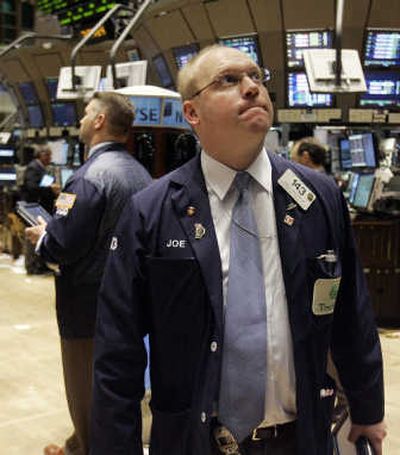Fed tries to stop the bleeding

NEW YORK – Wall Street closed out a difficult week with a mixed finish Friday after the Federal Reserve injected billions of dollars into the banking system to calm markets torn by worries about evaporating credit. The Dow Jones industrials, down more than 200 points during the session, ended with just a 31-point deficit and managed to post a gain for the week.
The stock market, which has been gyrating for weeks over fears that credit is drying up, pared its losses after the Fed’s injections of cash and following morning comments from the central bank that it would do all it can to “facilitate the orderly functioning of financial markets.” The steep declines seen at times during the session and persistent volatility, however, showed the depths of fear that had some investors yanking money out of stocks.
The Fed added $19 billion in liquidity to the market Friday morning, then another $16 billion and, finally, $3 billion.
Federal Reserve policymakers “are trying to do everything they can short of cutting the federal funds rate” to try to calm the markets, said Ed Yardeni, president of Yardeni Research in Great Neck, N.Y.
But, he said, “I think they probably have to cut rates, and probably before their scheduled September meeting.”
He noted that it was Fed rate cuts that calmed the market after the 1998 Russian debt crisis and the implosion of the hedge fund Long-Term Capital Management.
The Dow closed down 31.14, or 0.23 percent, at 13,239.54. On Thursday, the Dow fell 387 points and extended a series of triple-digit moves that began in late July.
Friday’s moves were typical of the zigzag trading in the Dow since the index closed at a record 14,000.41 on July 19. The Dow is down about 761 points, or 5.4 percent, from its record close.
Broader stock indicators finished mixed Friday. The Standard & Poor’s 500 index edged up 0.55, or 0.04 percent, to 1,453.64, and the Nasdaq composite index fell 11.60, or 0.45 percent, to 2,544.89.
All three indexes still finished higher for the week: The Dow rose 0.44 percent, the S&P advanced 1.44 percent and the Nasdaq added 1.34 percent. Sharp gains such as the Dow’s 287-point climb Monday left stocks better able to weather Thursday’s plunge.
The Russell 2000 index of smaller companies rose 3.91, or 0.50 percent, to 788.78 Friday, and ended the week with a 4.41 percent gain.
The New York Fed, which carries out the central bank’s market operation, announced a three-day repurchase agreement of mortgage-backed securities and then two more of the so-called “repo” moves to inject liquidity into the market. The Fed’s maneuvers came after the federal funds rate, the amount banks charge each other for overnight loans, ticked above 6 percent again Friday – well above the Fed’s target of 5.25 percent and a sign that credit was becoming harder to obtain.
The Fed stepped in after the same occurrence Thursday, injecting $24 billion in temporary reserves to the U.S. banking system. In a repo, the Fed arranges to buy securities from dealers, who then deposit the money the Fed has paid them into commercial banks.
“It’s encouraging because it’s a proactive step and they’re not just focused on the inflation numbers and not ignoring turmoil in the credit market,” said John Miller, head of the fixed income funds at Nuveen Asset Management.
The Fed’s moves Thursday and Friday follow its August meeting Tuesday at which it left short-term interest rates unchanged, as it has done for more than a year. In its statement following the meeting, the bank said its primary concern remains inflation.
But the tumultuousness of the final two sessions of the week, which followed a sharp run-up in the week’s first three sessions, has some market observers wondering whether the Fed will need to take added steps to douse some of the credit fears that have gripped the markets. So while some are now calling for a rate cut at the Fed’s September meeting or even sooner, others contend investors will in any case first need to gather some confidence that the subprime woes and the credit market tightening aren’t lethal for the economy and the markets.
“The confidence will be restored over time if the economy and the financial markets are resilient enough to overcome these kinds of announcements and view them in isolation,” Miller said in reference to disclosures such as the one Thursday from French bank BNP Paribas that it was freezing three funds that invested in U.S. subprime mortgages because it was unable to properly value their assets.